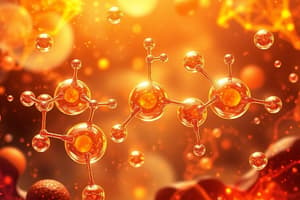Podcast
Questions and Answers
What is the general formula of aldehydes?
What is the general formula of aldehydes?
- R2C=O
- RCHO (correct)
- RCOR'
- RCOOH
Which reagent can be used to differentiate between aldehydes and ketones?
Which reagent can be used to differentiate between aldehydes and ketones?
- Sodium hydroxide
- Hydrochloric acid
- Tollen's reagent (correct)
- Benedict's reagent
What phenomenon occurs when an aldehyde reacts with Tollen's reagent?
What phenomenon occurs when an aldehyde reacts with Tollen's reagent?
- Color change to blue
- Production of a gas
- Generation of a silver mirror (correct)
- Formation of a precipitate
Which of the following compounds is classified as a ketone?
Which of the following compounds is classified as a ketone?
Which property differentiates aldehydes from ketones?
Which property differentiates aldehydes from ketones?
What is the main role of ammonium hydroxide in Tollen's reagent?
What is the main role of ammonium hydroxide in Tollen's reagent?
Which of the following statements about the carbonyl group is correct?
Which of the following statements about the carbonyl group is correct?
What is typically observed when aldehydes react with the 2,4-Dinitrophenylhydrazine reagent?
What is typically observed when aldehydes react with the 2,4-Dinitrophenylhydrazine reagent?
What color change indicates a positive result when testing for aldehydes using Fehling's reagent?
What color change indicates a positive result when testing for aldehydes using Fehling's reagent?
Which aldehydes are known to undergo the Cannizzaro reaction?
Which aldehydes are known to undergo the Cannizzaro reaction?
What is observed during a positive Iodoform test for aldehydes with terminal methyl groups?
What is observed during a positive Iodoform test for aldehydes with terminal methyl groups?
Which statement is true about ketones in relation to Fehling's test?
Which statement is true about ketones in relation to Fehling's test?
What happens when an aldehyde is subjected to the polymerization reaction with resorcinol in sulfuric acid?
What happens when an aldehyde is subjected to the polymerization reaction with resorcinol in sulfuric acid?
What is the role of sodium hydroxide in the Cannizzaro reaction?
What is the role of sodium hydroxide in the Cannizzaro reaction?
What distinguishes aromatic aldehydes in relation to Fehling's test?
What distinguishes aromatic aldehydes in relation to Fehling's test?
In the sodium nitroprusside test, what indicates a positive result?
In the sodium nitroprusside test, what indicates a positive result?
Flashcards
Aldehyde General Formula
Aldehyde General Formula
RCHO, where R can be aliphatic or aromatic, and in formaldehyde, R is a hydrogen atom
Ketone General Formula
Ketone General Formula
RCOR', where R and R' can be either aliphatic or aromatic groups.
2,4-Dinitrophenylhydrazine Test
2,4-Dinitrophenylhydrazine Test
A general test for aldehydes and ketones, producing a yellow/orange precipitate.
Tollen's Reagent
Tollen's Reagent
Signup and view all the flashcards
Tollen's Test Procedure
Tollen's Test Procedure
Signup and view all the flashcards
Fehling's Reagent
Fehling's Reagent
Signup and view all the flashcards
Aldehyde Oxidation
Aldehyde Oxidation
Signup and view all the flashcards
Carbonyl Group
Carbonyl Group
Signup and view all the flashcards
Fehling's Test
Fehling's Test
Signup and view all the flashcards
Aldehyde
Aldehyde
Signup and view all the flashcards
Ketone
Ketone
Signup and view all the flashcards
Iodoform Test
Iodoform Test
Signup and view all the flashcards
Sodium Nitroprusside Test
Sodium Nitroprusside Test
Signup and view all the flashcards
Cannizzaro Reaction
Cannizzaro Reaction
Signup and view all the flashcards
Polymerization Reaction
Polymerization Reaction
Signup and view all the flashcards
Terminal Methyl Group
Terminal Methyl Group
Signup and view all the flashcards
Study Notes
Aldehyde and Ketone Identification
- Aldehydes: Compounds with the general formula RCHO. R can be aliphatic or aromatic; in formaldehyde, R is a hydrogen atom.
- Ketones: Compounds with the general formula RCOR'. R and R' can be aliphatic or aromatic.
- Functional Group: Both contain a carbonyl group (C=O). This group is crucial to their chemical and physical properties.
- Examples: Formaldehyde, acetaldehyde, propionaldehyde, benzaldehyde, salicylaldehyde, acetone, acetophenone, benzyl methyl ketone, and benzophenone.
Chemical Reactions
- 2,4-Dinitrophenylhydrazine (2,4-DNPH) Test: A general test for both aldehydes and ketones. A yellow or orange precipitate forms.
- This reagent is added to the unknown compound (2 drops).
- A precipitate indicates the presence of either an aldehyde or ketone.
- If insoluble in water, dissolve in methanol before adding the reagent.
Differentiation Tests
-
Tollen's Test: Used to distinguish aldehydes from ketones.
- Positive result: Formation of a silver mirror.
- This is due to the oxidation of the aldehyde, and reduction of silver ions.
- Negative result: No silver mirror forms if the compound is a ketone.
- Alkaline medium is necessary. Ammonium hydroxide is used to prevent precipitation of silver oxide.
- Positive result: Formation of a silver mirror.
-
Fehling's Test: Also used to distinguish aldehydes from ketones.
- Positive result: Formation of a red cuprous oxide precipitate (Cu2O).
- Deep blue Fehling's solution changes color to green, orange, or red, with final precipitate.
- Negative result: No change in Fehling's solution if the compound is a ketone.
- Positive result: Formation of a red cuprous oxide precipitate (Cu2O).
Special Tests for Terminal Methyl Groups
-
Iodoform Test: For aldehydes/ketones containing a terminal methyl group in their structure. More details needed on the procedure to determine a positive test.
-
Sodium Nitroprusside Test: Positive result is a red complex for compounds containing a terminal methyl group.
-
Cannizzaro Reaction: This reaction occurs for aldehydes (like benzaldehyde, salicylaldehyde, formaldehyde) that lack alpha hydrogen atoms. The aldehyde undergoes self-oxidation-reduction. The result is the formation of an alcohol and salt of a carboxylic acid and/or the acid itself. Details of the procedure will determine positive observations.
Studying That Suits You
Use AI to generate personalized quizzes and flashcards to suit your learning preferences.




